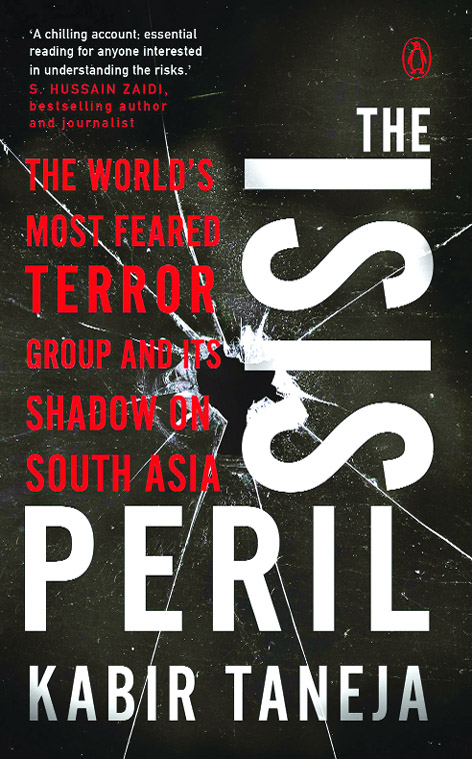Deepak Raj
The book The ISIS Peril is the result of extreme researching capabilities of Kabir Taneja. The author comments that the 2003 invasion of Iraq by the USA as a fallout of the September 11 terror attacks in New York in 2001 was the starting point of the creation of the jihadist faction known today as the Islamic State of Iraq and Syria. According to estimates the Islamic State until recently was earning up to $ 1 million per day by selling oil produced from makeshift refineries on the black market. The fight for access to Syria’s modest oil fields by groups such as ISIS and others fuelled a war within the broader civil war. However, one of the most important aspects to understand the rise of ISIS is to begin with the total fundamentals, the fact that the terror group was not a product of the Syrian civil war. It only grew because of the conflict. ISIS rose from the remote areas of Syria and Iraq. Its propaganda rayed into the drawing rooms, bedrooms and smart phones used by children, effectively and strategically. ISIS has destroyed and recreated the narratives of Islamist terrorism previously held by the likes of Al Qaeda. The author substantiates his arguments with individual stories of many especially about Zarqawi, the ISIS founder and jihadist and about a video starting with ISIS fighter Abu Safiyya displaying the distance Safiyya himself must have travelled to join the so-called Islamic State.
Referring to ISIS penetration into India, he quotes Salman Khurshid, the then Foreign Minister of India who said in Geneva-11 in 2014 that India has important stakes in the Syrian conflict. It shares historical and civilizational bonds with the wider West Asia and Gulf region.
Any spill over from the Syrian conflict has the potential of affecting negatively on our larger interests. Analysing past, present and future the author terms ISIS and south Asia as a smorgasbord of threats and fear.
In 2018, the UAE deported around a dozen people to India who were suspected of pro-ISIS activities. Dr. Anwar Mohammmad Gargash, UAE’s Minister of State of Foreign Affairs said during his visit to New Delhi that there are no grey areas and we need to tackle this (ISIS) threat. Nobody is immune. If you think you are immune (and) you are going to be negligent, you are going be hit.
The swift fall of Mosul and of Tikrit were treated as declarations by ISIS of both their capability and seriousness in acquiring a territorial governorate for the so-called caliphate. While Iraq is at a comparatively more straightforward war against ISIS, the involvement of Iran and Russia makes Syria as much more complicated theatre.
The period from 2008 to 2011 was one that moulded many of the political and societal upheavals in the Middle East, out of which many of the crises of both overthrowing of current rulers and emergence of new non-state militant actors came into being. In early as mid-2017, the narratives around the defeat of the ISIS caliphate were starting to get promoted in the press. In an interview in October 2018, President Trump told journalists that ISIS had been defeated.
According to the author, the fall of Mosul was a pivotal point in the war against ISIS. Despite the initial euphoria, ISIS has not been able to create much of an influence in India. So far, India has had some eighty-two active cases of investigations on individuals suspected of engaging in pro-ISIS activities. Under the caption The Post -ISIS Era author writes that ISIS is expected to operate more as terror organisations, closer to the operational models of Al Qaeda and its peers, as opposed to ‘caliphate.’ According to some reports, ISIS leaders have already started to move money out of Syria and Iraq in the form of secret financial transfers and business investments.
ISIS is using Twitter, Facebook, Whatsapp and most importantly Telegram. In understanding ISIS’s media strategy, a key document is Media Operative. The Ghazwathul Hind Channel became a place to share a multitude of predominantly Indian content.
The author Kabir Teneja finally comes to the conclusion that the the defeat of the Islamic State is not the defeat of ISIS. The immediate threat from ISIS is not on the battleground anymore, but in civilian spaces. ISIS may be defeated geographically, but as an idea, it persists. This persistence will have no easy solutions, and the world has a long fight against an idea in front of it.
Apart from the Introduction, 186-page-book consists of eighteen chapters. The author provides twelve-page notes in the end that unknot some unexplained things. Kabir Taneja dedicates the book to his parents. A well researched book, giving almost all details regarding rise and fall of ISIS.
There could have been no better quote beginning the book than Cormac McCarthy, ‘War was always here. Before man was, war waited for him. The ultimate trade waiting for its ultimate practitioner.’
Trending Now
E-Paper


